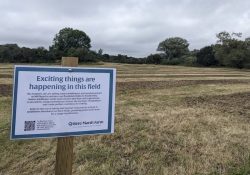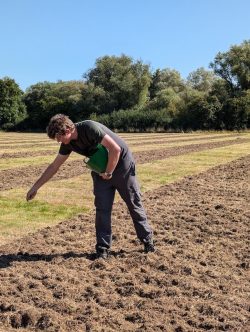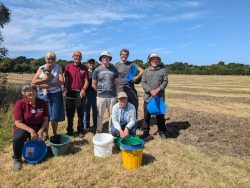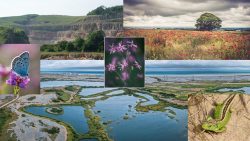Eco-soundings – our environmental news round-up
WELCOME to our round-up of eco and environmental news from the Fine Times Recorder. We feel that there is a real need in this area to have somewhere people who are interested can find out about groups working on sustainability projects, general news on green issues, events, news, exhibitions, Transition Town projects, etc.
We will welcome news, events and short articles from anyone involved in community groups or their own individual projects. Contact us by email info@nulltheftr.co.uk or by Twitter, @yourFTR
****
Rainforests teetering on the edge
 EAST Devon’s Shute Festival continues its series of inspiring talks on 12th March at the Peek Chapel in Pound Street, Lyme Regis, with Julia Hailes, ambassador for the Rainforest Trust. She has recently returned from the Guyanas – British Guiana (as it was), Suriname and French Guiana – where the forests still stand, 83.5%, 93% and 98% intact.
EAST Devon’s Shute Festival continues its series of inspiring talks on 12th March at the Peek Chapel in Pound Street, Lyme Regis, with Julia Hailes, ambassador for the Rainforest Trust. She has recently returned from the Guyanas – British Guiana (as it was), Suriname and French Guiana – where the forests still stand, 83.5%, 93% and 98% intact.
But, she warns, they are teetering on the edge. Oil has been discovered. A boon or a bane? Logging, mining and burning are widespread. And there is another looming threat — Guyana is being touted as the future ‘breadbasket of the Caribbean,’ a grand plan that could see vast tracts of rainforest cleared for industrial-scale agriculture. Meanwhile, a flood of Venezuelan refugees brings even more pressure to lands already at risk.
The talk, How Rainforests have Changed My Life, is free but booking is essential to secure a place. Julia Hailes, who lives in Dorset, is a sustainability pioneer with nearly 40 years in the green sector. She is a campaigner, writer, speaker and consultant and has written or co-written, nine environmental books, including The Green Consumer Guide, which sold over one million copies worldwide, and was co-founder, with John Elkington, of the first environmental think tank and consultancy, SustainAbility in 1987, advising blue chip companies such as Procter & Gamble and M&S.
For more information visit shutefest.org.uk
*******
 “Green win” with new lighting at Poole’s Lighthouse
“Green win” with new lighting at Poole’s Lighthouse
A NEW lighting system at Poole’s Lighthouse arts centre is expected to pay for itself in little more than a year, with savings forecast of almost £10,000 and nearly eight tonnes of CO2e*.
The Lighthouse management has recently completed essential improvement works to enhance energy efficiency, reduce environmental impact and ensure the long-term sustainability of its operations. The result is what chief executive Elspeth McBain describes as “a major green win.”
The project centred around the installation of LED lighting in front of house and backstage areas, complemented by the strategic placement of movement sensors. The works cost nearly £12,450, of which £5,000 was paid for by a decarbonisation grant from BCP Council with funding through the UK Shared Prosperity Fund and Lighthouse making up the difference.
“We’re on course to save 7.9 tonnes of CO2e with initial figures suggesting a financial saving of just over £9,700 a year as a result – so the cost of the entire investment will be made back in just over a year,” says Elspeth.
The global environmental situation is of great significance to the artistic community and Lighthouse is conscious of its responsibility to play a part in addressing this.
“There’s much more to be done,” adds Elspeth. “By far our biggest user of energy is our stage lighting/sound and in order to replace that with low energy we are continuing to actively seek funding support.”
* Calculation based on the four main greenhouse gases: carbon dioxide, methane, nitrous oxide and F-gas.
***
 Wildflower planting to boost floodplain biodiversity
Wildflower planting to boost floodplain biodiversity
A TEAM of Dorset conservation officers and volunteers has begun a project to plant native wildflowers and meadow grasses at Bere Marsh Farm near Shillingstone, aimed at enhancing biodiversity on the Stour floodplain fields.
The 92-acre Bere Marsh Farm, between the old Somerset and Dorset railway line and the river, is owned by the Countryside Regeneration Trust, a charity promoting nature-friendly farming to help reverse the biodiversity decline and combat climate change.
The team will be reseeding a total area of one hectare with brush-harvested seed from floodplain meadows managed by Wiltshire Wildlife Trust. The plan is to increase coverage over the rest of the floodplain fields at Bere Marsh in future years (a total of 13.5ha).
The CRT head of conservation and land management Helena Darragh explains why the project is so important: “Species-rich floodplain meadow habitat in Britain has dramatically declined due to agricultural intensification, urban and industrial development of these flat, low-lying and fertile areas, as well as alterations to their hydrology through changes to river systems.
 “Due to their proximity to watercourses, species-rich floodplain meadows were once the most productive fields on farms, receiving their nutrients each year through highly fertile silt deposited on the land during flood events. This special value has decreased with fertiliser now used more widely across farm holdings and high yielding grasses selected to grow hay or silage adding to the overall loss of this biodiverse habitat.”
“Due to their proximity to watercourses, species-rich floodplain meadows were once the most productive fields on farms, receiving their nutrients each year through highly fertile silt deposited on the land during flood events. This special value has decreased with fertiliser now used more widely across farm holdings and high yielding grasses selected to grow hay or silage adding to the overall loss of this biodiverse habitat.”
Floodplain meadows are characterised by diverse herb-rich swards and feature the iconic great burnet (Sanguisorba officinalis) plant with its crinkle-cut leaves, producing beautiful burgundy seed heads in summer. Other wildflowers include common sorrel (Rumex acetosa) and meadow vetchling (Lathyrus pratensis). “These magnificent lowland habitats contribute to nature-friendly farm practices through providing a valuable nutritious source of food for livestock,” says Helena.
During winter and spring months, floodplain meadows are often inundated with floodwater, providing nesting and feeding habitat for a huge array of birdlife. As the ground becomes drier, livestock can be let on to graze the early grass growth, before being shut out to allow wildflowers to come through and produce a herb-rich hay crop, and so the cycle comes full circle.
 Native wildflower seeds need contact with bare soil to germinate so machinery is used to scratch the top surface of vegetation away to create perfect conditions for sowing.
Native wildflower seeds need contact with bare soil to germinate so machinery is used to scratch the top surface of vegetation away to create perfect conditions for sowing.
“So, while it may not look much at first, keep an eye out in the spring and summer next year for a boost in wildflower abundance on these fields, providing pollen and nectar for a range of pollinators,” adds Helena. “With the UK now subject to more short, sharp downpours in winter months (and throughout the year) ensuring our floodplains function more effectively by storing water helps to alleviate flooding downstream and reduce soil erosion, providing benefits to local communities.”
Established in 1993, the Countryside Regeneration Trust (CRT) takes a holistic view of why the countryside matters. Wildlife, food production, employment, economics and development are all essential.
***

From quarries to nature reserves
IT is easy to look at a stone quarry and see nothing but destruction – a great scar in the landscape. But Andy Littler, geologist, chartered engineer and quarry manager, has a very different story to tell when he comes to Sladers Yard arts centre at West Bay, on Thursday 29th August, to give the next in the series of HOP – Help Our Planet – talks, starting at 7pm.
With a passion for natural history, Andy has pioneered the restoration of quarries back to biodiverse habitats across the UK for 40 years=. There are 2000 active and worked-out quarries across the UK, representing a huge opportunity to create specialist habitats where native flora and fauna can thrive.
Andy, who lives in Charmouth, wrote the first Quarry Biodiversity Action Plans in the UK and also assisted the South African government in forming their national plan. He runs courses for quarry professionals on the subject and was a trustee with two county wildlife trusts. Today he sits on the Dorset Wildlife Trust conservation committee and engages in practical volunteering.
He is currently working on quarry restoration projects along Puddletown Rd, Wareham, and at Chard. His HOP talk will be richly illustrated, and he will be happy to take questions on this or about quarrying and minerals generally.
A hot supper and bar will be available from 6pm. For tickets – proceeds to Dorset Wildlife Trust – please call 01308 459511 or email gallery@nullsladersyard.co.uk
****
Greener heating at Stourhead House
THE National Trust’s Stourhead House has a new greener heating system. It previously took 33,000 litres of oil to heat the Palladian house each year. Now the energy needs are provided by two woodchip boilers, saving thousands of pounds a year on heating bills and 90 tonnes of C02 emissions.
The new biomass system will be fuelled by locally sourced, sustainably grown wood supplied and chipped ready for use by local suppliers.
Tamsin Holmes, environmental practices coordinator, said “The switch to biomass for Stourhead House is a major part of our whole property ambition to stop using oil as an energy source.
“Nationally, the Trust has a target to generate 50 per cent of its in-hand energy needs from renewable sources by 2020. The switch to woodchip in Stourhead House will contribute 1 per cent towards the national target.”
The biomass boilers have been installed in the renovated Pumphouse behind Stourhead House. A new woodchip store has been built behind the Pumphouse, designed to be sympathetic to the original building, and to blend in with its surroundings.